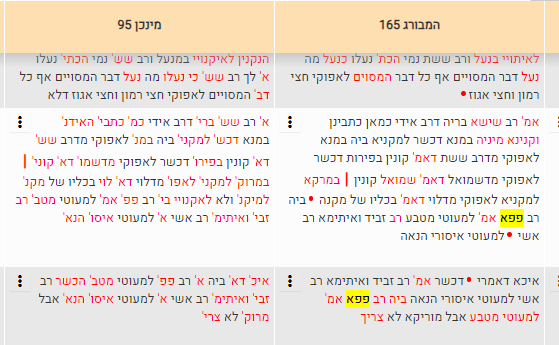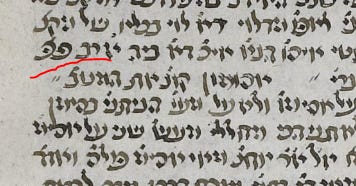Correction: Rav Pappa Defense
I dislike how corrections are often buried in a separate section. I made a mistake in yesterday’s post, forgetting about a Rav Pappa statement at the end of the sugya. So instead of appending it to bottom of the preceding post, which wouldn’t have visibility to everyone who received the post by email, I will put it here.
Essentially, yesterday I questioned the Rif’s statement that Rav Pappa, who was batrai, had stated that coins could not be the handkerchief of kinyan sudar. I looked only at Rav Pappa statements on that daf, and didn’t see anything compelling to support saying Rav Pappa held this. However, I forgot about this one.
You can see the original post here:
In Defense of Rav Pappa
In today’s daf (Bava Metzia 46a), and yesterday’s, Rav Pappa said that even according to the one (either Rav or Levi) who says that a coin cannot act as the handkerchief of chalifin, it can still be the target of chalifin. His argument is by analogy to Rav Nachman. Rav Nachman maintained that the handkerchief of
Note that I am not retracting all of it, just the following point. On 42a-b, we see the following:
אָמַר רַב שֵׁשֶׁת בְּרֵיהּ דְּרַב אִידִי: כְּמַאן כָּתְבִינַן הָאִידָּנָא ״בְּמָנָא דְּכָשַׁר לְמִקְנְיָא בֵּיהּ״. ״בְּמָנָא״ – לְאַפּוֹקֵי מִדְּרַב שֵׁשֶׁת, דְּאָמַר קוֹנִין בְּפֵירוֹת. ״דְּכָשַׁר״ – לְאַפּוֹקֵי מִדִּשְׁמוּאֵל, דְּאָמַר קוֹנִין
Rav Sheshet, son of Rav Idi, said: In accordance with whose opinion do we write today in documents that the transaction was effected with a vessel that is fit to acquire items with it? The Gemara explains: The term with a vessel serves to exclude the opinion of Rav Sheshet, who says: One acquires an item through a transaction of symbolic exchange by using produce. The term that is fit serves to exclude the opinion of Shmuel, who says: One acquires an item
בְּמָרוֹקָא. ״לְמִקְנְיָא״ – לְאַפּוֹקֵי מִדְּלֵוִי, דְּאָמַר בְּכִלְיוֹ שֶׁל מַקְנֶה, קָא מַשְׁמַע לַן ״לְמִקְנְיָא״ וְלָא ״לְ[אַ]קְנוֹיֵי״. ״בֵּיהּ״ – רַב פָּפָּא אָמַר: לְמַעוֹטֵי מַטְבֵּעַ. וְרַב זְבִיד, וְאִיתֵּימָא רַב אָשֵׁי אָמַר: לְמַעוֹטֵי אִיסּוּרֵי הֲנָאָה.
with date pits used for cleaning and smoothing parchment. The term to acquire items serves to exclude the opinion of Levi, who says that the symbolic exchange is effected by means of the vessels of the one transferring ownership of the item. This latter expression teaches us that the vessel is given to acquire and not to transfer ownership to the other. With regard to the term: With it, Rav Pappa said: It serves to exclude a coin, which cannot effect a symbolic exchange. And Rav Zevid, and some say Rav Ashi, said: It serves to exclude items from which deriving benefit is prohibited.
So, Rav Pappa himself explains that the then-current wording of recording transaction documents, and the word בֵּיהּ, to indicate that we rule exclude coin from sudar.
I could kvetch it that that he is explaining how others hold and formulate the document, but the straightforward reading is that he agrees.
The other way I could potentially kvetch this is to ask if Rav Pappa was the one who said it. Not because there are two versions, a lishna kamma and batra, or that in the next statement, we aren’t sure if it is Rav Ashi or Rav Zevid, so maybe some shift occurred. Rather, because maybe it is Rav Pappi rather than Rav Pappa.
Most manuscripts have Rav Pappa. There is, however, Munich, which in both instances writes Rav Papp’ and omits the last letter, either an aleph or a yud:
Still, it stands to reason that it is indeed Rav Pappa, so he holds this.
I remain unconvinced that he retracted for coin as target of chalipin.



